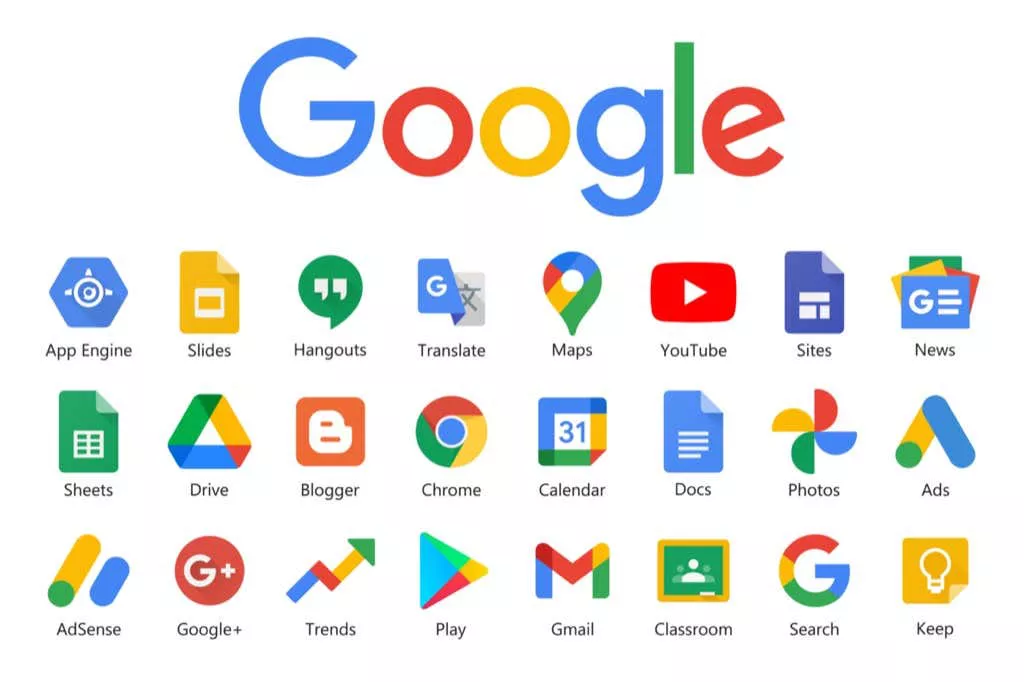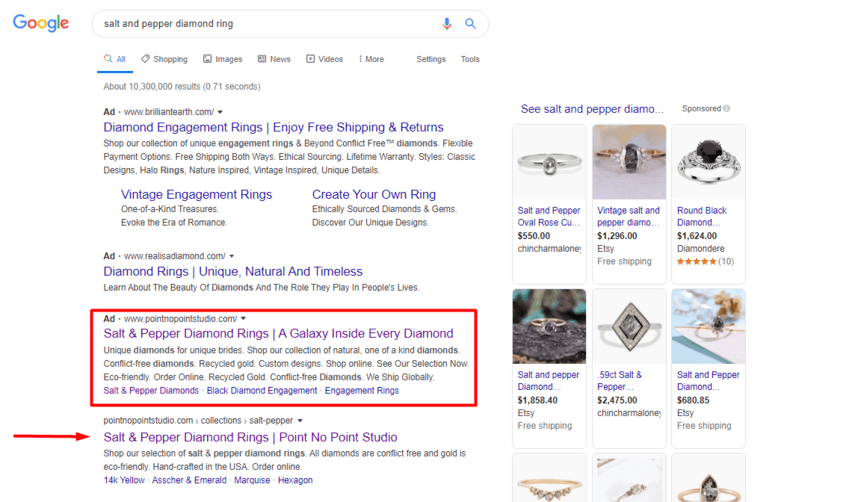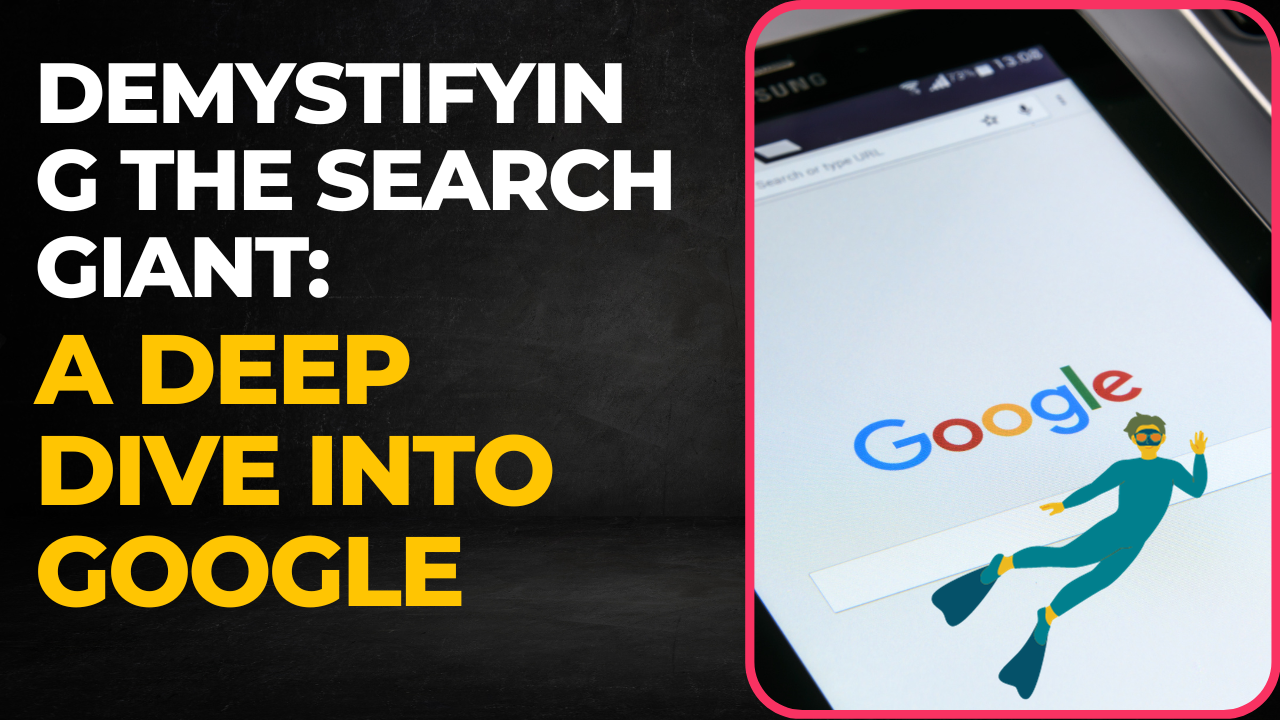Google Search, algorithms, data privacy, AI, and more! Decode the mysteries of Google, its impact on the web, and its vision for the future.
Google’s Humble Beginnings: From Dorm Room to Global Phenomenon
Let’s think this: two Stanford University students, Larry Page and Sergey Brin, hunched over computers in a cramped dorm room, tinkering with an algorithm unlike any other. Their audacious dream? To organize the world’s information and make it universally accessible and useful. Today, that dream has blossomed into a sprawling tech empire – Google, a name synonymous with search, innovation, and, for some, a looming digital behemoth.
But the Google we know today wasn’t born in a boardroom or Silicon Valley incubator. Its roots lie in that dorm room, fueled by youthful ambition and a revolutionary idea. Back in 1996, the internet was a fledgling beast, a chaotic web of information without a map. Searching for anything specific was akin to spelunking in a poorly lit cave – frustrating, time-consuming, and often fruitless.
Enter BackRub, Google’s original name, a clunky but aptly descriptive moniker for an algorithm that analyzed backlinks to determine the “importance” of webpages. It was a radical break from the keyword-matching systems of the time, placing an emphasis on quality and relevance over mere keyword stuffing.
BackRub quickly gained traction within the Stanford community, its crawl results proving far more useful than anything else available. Word spread, and soon, the dorm room experiment was attracting attention from venture capitalists and tech giants alike. In 1998, with a $100,000 check from Sun Microsystems co-founder Andy Bechtolsheim, Google Inc. was officially born.
The rest, as they say, is history. Google’s rise was meteoric. Its simple, clean interface and superior search accuracy won over users, and its innovative approach to advertising (think targeted text ads instead of intrusive banners) generated massive revenue. From Gmail to Google Maps, YouTube to Android, Google kept churning out game-changing products, each one expanding its reach and influence.
Today, Google is a verb, a synonym for searching for information online. It’s a household name, a ubiquitous presence in our digital lives. But its journey from dorm room to global phenomenon is a story worth remembering. It’s a testament to the power of human ingenuity, the audacity of dreams, and the relentless pursuit of making the world’s information accessible to all.
This is just the beginning of our exploration into Google’s remarkable journey. In the next sections, we’ll delve deeper into its innovations, its controversies, and its vision for the future. Get ready to embark on a deep dive into the world of the search giant, from its humble beginnings to its ever-expanding frontiers.
Birth of Google Search Engine:
In the dimly lit confines of a Stanford dorm room, 1996 birthed a revolution. Two young minds, Larry Page and Sergey Brin, weren’t brewing coffee, but an ingenious algorithm they named BackRub. It combed the nascent web, not for gold, but for connections, ranking pages based on their links, like votes in a digital popularity contest. BackRub, soon renamed Google, wasn’t just searching the web; it was organizing it, taming the chaotic wilderness of information with a simple, elegant idea. This humble dorm room innovation would become the world’s most powerful search engine, forever changing how we navigate the digital universe.

RankBrain and the Quest for Relevance:
Imagine a vast library, not with dusty shelves but with information streaming at light speed. That’s the internet, and Google serves as its ever-evolving librarian, constantly striving to deliver the most relevant results to your queries. At the heart of this quest lies RankBrain, a complex algorithm that goes beyond keyword matching to understand the true intent behind your search.
Read Also: Top 5 Advantage and Disadvantage of Google
Think of it as a sophisticated language model, trained on billions of web pages and user interactions. It analyzes not just keywords, but also context, user location, search history, and even the freshness and reliability of sources. It can even decipher the nuances of your search, recognizing synonyms and understanding implied meanings.
The result? Search results that are surprisingly accurate and often anticipate your needs before you even articulate them. Imagine searching for “best hiking trails near Jaipur” and finding not just a list of trails, but also curated options based on your fitness level, preferred difficulty, and even the current weather conditions. That’s the power of RankBrain at work.
But the quest for relevance is never-ending. As the web evolves and user behavior changes, RankBrain constantly adapts and learns. It’s a complex dance between understanding user intent, rewarding high-quality content, and ensuring fair competition among websites. While its inner workings remain shrouded in some secrecy, one thing is clear: RankBrain is a testament to Google’s relentless pursuit of making the internet a more accessible and informative place.
So, the next time you hit “enter” on a Google search, remember the invisible librarian working behind the scenes, using RankBrain as its magic wand to point you towards the most relevant and valuable information on the web.

Beyond Search: Building an Ecosystem of Products and Services
Beyond the ubiquitous search bar, Google has blossomed into a sprawling ecosystem of products and services, seamlessly woven into our daily lives. Think beyond “finding information” and imagine a digital tapestry richer and more interconnected than ever before.
Start with Gmail, your digital post office handling both personal and professional communication. Then, navigate with confidence using Google Maps, your trusty guide through physical and virtual landscapes. Store your precious memories and documents in the cloud with Google Drive, accessible from anywhere with an internet connection.
But the journey doesn’t end there. Immerse yourself in the vibrant world of YouTube, a treasure trove of videos entertaining, educating, and connecting you with diverse voices. Collaborate effortlessly with colleagues in real-time through Google Docs, Sheets, and Slides, fostering seamless teamwork across distance and platforms.
This just scratches the surface. Google Assistant, your ever-present digital helper, answers your questions, schedules your appointments, and even controls your smart home devices. Pixel phones, seamlessly integrated with Google’s services, offer a streamlined mobile experience. And through Android, Google powers billions of devices worldwide, shaping the very fabric of the mobile landscape.
From humble beginnings as a search engine, Google has transformed into a digital universe, one click at a time. This vibrant ecosystem of products and services continues to evolve, promising to further blur the lines between the physical and digital worlds, and redefine what it means to connect, create, and experience life in the 21st century.

The Engine that Drives the Web: How Google Impacts Our Digital Lives
Imagine a world before Google. A world where finding information meant scouring dusty encyclopedias or haggling with librarians. A world where connecting with loved ones involved snail mail and landlines. Today, thanks to the ubiquitous presence of Google, that world seems as distant as dinosaurs roaming the Earth.
From the moment we wake up and check the weather on our smartphones to the late-night Wikipedia rabbit hole we dive into before bed, Google is the invisible but ever-present engine driving our digital lives. It’s not just a search engine anymore; it’s the very fabric of the internet, woven into the way we communicate, learn, and even think.
The information tsunami:
Think of Google as a colossal dam, holding back an ocean of information. We, the internet surfers, stand on the shore, thirsty for knowledge. With a simple query, the dam opens, and a tsunami of data washes over us – news articles, blog posts, scientific papers, and countless other digital gems. All neatly categorized, ranked by relevance, and delivered within milliseconds.
But Google’s impact goes beyond mere information retrieval. It shapes our online landscape in profound ways:
The echo chamber effect:
Algorithms, Google’s secret sauce, personalize our search results, showing us what they think we want to see. This can be convenient, tailoring our newsfeeds and recommendations to our interests. But it can also create echo chambers, where we’re only exposed to information that confirms our existing beliefs, potentially hardening our biases and hindering critical thinking.
The democratization of knowledge:
Once locked away in ivory towers and dusty libraries, knowledge is now freely available to anyone with an internet connection. Google has democratized education, allowing anyone to learn about astrophysics, Shakespeare, or the mating habits of the Patagonian mara, all with a few clicks.
The power of connection:
Lost in a bustling city? Need to contact a long-lost friend? Google Maps and Gmail have become our digital lifelines, bridging geographical and social distances. We can find our way anywhere, stay in touch with anyone, and build virtual communities that transcend borders and cultures.
The story of Google’s impact on our digital lives is still unfolding. This article will delve deeper into the various ways Google has transformed the web and explore the challenges and opportunities that lie ahead. We’ll examine the evolving algorithms, the privacy concerns, and the ethical dilemmas that come with wielding such immense power.
So, buckle up, dear reader, as we embark on a journey into the heart of the Googleverse. Together, we’ll unravel the mysteries of this digital leviathan and understand how it continues to shape our world, one search query at a time.
Information at Your Fingertips:
Imagine a world where towering libraries of Alexandria were accessible from your pocket, a vast ocean of knowledge just a tap away. This is the reality we live in today, thanks to the internet and the democratization of information. No longer are dusty tomes and gatekeepers the sole custodians of wisdom. With a search engine, anyone can delve into the depths of history, dissect scientific discoveries, or explore distant cultures – all in the blink of an eye.

This revolution has leveled the playing field, empowering individuals with the tools to learn, grow, and challenge the status quo. Education, once a privilege, is now readily available, breaking down barriers and fostering intellectual curiosity across the globe. The rise of citizen journalism and independent research gives voice to marginalized communities and empowers them to tell their own stories. However, amidst this abundance, we must navigate the currents of misinformation and cultivate critical thinking skills to discern truth from falsehood.
The democratization of knowledge is a powerful force, one that continues to reshape our world. As we harness its potential, let us remember the responsibility that comes with it – to use information wisely, bridge the digital divide, and ensure that everyone has the opportunity to swim in this boundless ocean of knowledge.
Shaping Online Trends and Conversations:

Google isn’t just a mirror reflecting our online interests, it’s a powerful lens distorting and amplifying them. Through its search algorithms, it shapes what topics rise to the top, influencing what we click, share, and ultimately discuss. Trending searches bubble up into national conversations, while personalized results create echo chambers, reinforcing existing beliefs. Even viral phenomena sprout from the fertile ground of Google’s algorithms, shaping online discourse and dominating our attention one meme, hashtag, or challenge at a time. In essence, Google is not just a passive observer of our online lives, it’s an active participant, subtly orchestrating the digital conversations that define our era.
The Power of Algorithms: From Search Bias to Personalized Experiences
Algorithms, the silent puppeteers of the digital world, hold immense power. They decide what news you see, what products you buy, and even the music you jam to. This power, however, is a double-edged sword. On one hand, algorithms personalize our experiences, tailoring them to our unique preferences. Imagine Netflix recommending the perfect movie for your Friday night in, or Spotify creating a playlist that matches your mood perfectly. It’s like having a digital genie at your beck and call, anticipating your needs before you even realize them.

But this very personalization can also lead to search bias, where algorithms inadvertently reinforce existing prejudices and limit our exposure to diverse perspectives. Imagine only seeing news articles that confirm your existing beliefs, or being constantly bombarded with ads for products you’ve already bought. This echo chamber effect can stifle intellectual growth and create a narrow, insular worldview.
So, how do we harness the power of algorithms while mitigating their biases? The key lies in transparency and user control. Algorithms should be open to scrutiny, allowing users to understand how their data is being used and what factors influence their online experiences. Additionally, providing options for personalization alongside the ability to opt out of algorithmic filters can empower users to navigate the digital world on their own terms.
Ultimately, algorithms are tools, and like any tool, their impact depends on the hands that wield them. By fostering responsible development and empowering users, we can ensure that algorithms become a force for good, enriching our lives with personalized experiences while safeguarding against the pitfalls of bias.
The Inside Story: A Peek into Google’s Culture and Work Ethic
Imagine a vibrant playground for the mind, where nap pods coexist with giant T-Rex skeletons, and where free gourmet meals fuel brainstorming sessions under rainbow-colored slides. This isn’t a scene from a futuristic movie; it’s a typical day at Google’s legendary headquarters, the Googleplex.
Google’s culture and work ethic are as much a part of its identity as its innovative search engine. From its “moonshot” projects aiming to solve humanity’s biggest challenges to its data-driven decision-making processes, the inside story of Google is a fascinating glimpse into the inner workings of a tech giant that continues to shape our world.
Moon Shots and Big Bets:

Embracing innovation and pushing the boundaries of technology is like stepping into a boundless field of possibility. It’s the thrill of defying limitations, venturing beyond the familiar, and crafting solutions that were once mere dreams. Imagine scaling a majestic mountain, each step taking you closer to breathtaking vistas that were previously hidden from view. That’s the essence of technological exploration – a relentless pursuit of the unseen, the untrodden, and the awe-inspiring potential that lies just beyond the horizon.
It’s about challenging the status quo, questioning long-held assumptions, and daring to imagine a world where the impossible becomes not just feasible, but commonplace. It’s about harnessing the power of human ingenuity to solve the world’s most pressing problems, from curing diseases to tackling climate change to connecting people across continents in a blink.
Pushing the boundaries of technology isn’t just for Silicon Valley giants or lone-wolf inventors in garages. It’s for everyone. It’s about the teacher who embraces new learning platforms to ignite young minds, the doctor who utilizes AI to diagnose diseases with unprecedented accuracy, or the artist who uses immersive virtual reality to create groundbreaking masterpieces.
Every one of us has the potential to be an innovator, to push the boundaries of what’s possible in our own unique way. So, let’s embrace the spirit of curiosity, the thirst for knowledge, and the audacious courage to step into the unknown. Let’s paint the world with the vibrant colors of our imagination and build a future brimming with technological wonders that will benefit generations to come.
Data-Driven Decisions:

Google, the undisputed data alchemist, transforms mountains of information into gold. Its secret ingredient? Algorithms. Google analyzes user searches, clicks, and interactions to understand desires, predict trends, and personalize experiences. This data fuels intelligent product development, targeted advertising, and even shapes the future of the web. Imagine, from predicting flu outbreaks to optimizing traffic flows, Google’s data-driven decisions touch every aspect of our lives, subtly whispering, “I know what you want before you do.”
The Googleplex and Beyond:

Step inside the vibrant campus of the Googleplex, where colorful buildings adorned with whimsical sculptures like a giant T-Rex and a bright Android robot hint at the playful spirit that fuels the tech giant’s innovations. Here, amidst sprawling greenery and interconnected offices buzzing with ideas, Google’s employees have access to everything from on-site gyms and gourmet cafeterias to nap pods and even a slide to whoosh between floors. But Google’s reach extends far beyond its iconic headquarters. With offices nestled in bustling metropolises and serene landscapes around the globe, Google’s diverse workforce reflects the company’s mission to connect the world’s information and make it universally accessible and useful.
From the playful energy of the Googleplex to the global network of innovation hubs, Google’s physical spaces embody the company’s commitment to creativity, collaboration, and a touch of whimsy – a testament to the fact that even in the realm of cutting-edge technology, a little fun can go a long way.
Google’s Controversies: Privacy Concerns, Antitrust Issues, and Ethical Dilemmas
Data Privacy in the Age of Big Tech:
In the digital age, we face a constant tug-of-war: user convenience vs. personal information security. We crave the seamless access and effortless experiences that technology offers, from instant shopping to personalized recommendations. But at what cost do we surrender our private data, potentially fueling algorithms that could exploit or manipulate us?

The challenge lies in finding a delicate balance. On the one hand, robust security measures can create friction, adding extra steps or requiring complex passwords that hinder our online flow. On the other hand, lax data protection leaves us vulnerable to breaches, identity theft, and targeted advertising that feels eerily invasive.
The key lies in fostering transparency and control. Companies must be clear about what data they collect, how they use it, and with whom they share it. Users, in turn, should be empowered to make informed choices about their privacy settings and have readily available tools to manage their data.
Striking this balance isn’t easy, but it’s crucial. Let’s strive for a future where convenience and security coexist, where we can reap the benefits of technology without sacrificing our privacy.
The Antitrust Debate:
Google, the ubiquitous search engine and tech behemoth, casts a long shadow over the digital landscape. Its dominance in areas like search, online advertising, and mobile operating systems has prompted concerns about stifling competition and fair play. The debate over regulating Google hinges on balancing innovation and consumer welfare.

Proponents of regulation argue that Google’s size and influence give it unfair advantages, allowing it to manipulate search results, prioritize its own services, and squeeze out smaller competitors. This, they say, hinders innovation and limits consumer choice. On the other hand, Google maintains that its dominance stems from superior products and services, and that regulation could stifle its ability to innovate and compete globally.
Finding the right balance is crucial. Overly restrictive regulations could hamper innovation and economic growth. However, without proper oversight, Google’s power could continue to grow unchecked, potentially harming competition and consumer choice.
The conversation around regulating Google is far from over, and it will likely be a key discussion point in the years to come as the tech landscape continues to evolve.
Algorithmic Bias and Fake News:
Maintaining accuracy in our information landscape is akin to battling a many-headed beast. Misinformation, like the mythical Hydra, sprouts new lies from every fact debunked.

The digital age has democratized information access, but it has also empowered the spread of falsehoods with alarming ease. Social media algorithms, often optimized for engagement over truth, can amplify fake news like wildfire. Malicious actors exploit our emotional biases and confirmation bubbles to sow discord and manipulate opinions.
The challenges are vast and complex. Fact-checking takes time and resources, often lagging behind the rapid spread of misinformation. Deepfakes and AI-generated content blur the lines between truth and fiction, making it harder to discern reality. And human psychology, susceptible to biases and heuristics, can be easily exploited by bad actors.
Despite the difficulties, the fight for accuracy is far from lost. Journalists and researchers are developing new tools and techniques to identify and debunk misinformation. Social media platforms are under increasing pressure to implement stricter fact-checking measures and combat algorithmic bias. Educational efforts can equip individuals with the critical thinking skills needed to navigate the information landscape.
Ultimately, maintaining accuracy requires a multi-pronged approach. It demands constant vigilance, technological innovation, and a commitment to critical thinking from both individuals and institutions. Only then can we slay the Hydra of misinformation and ensure a future where truth prevails.
The Future of Google: Emerging Technologies and New Frontiers
Artificial Intelligence and the Rise of Machine Learning:
From the moment you wake up and check your phone to the final email you send before bed, Google’s AI is silently working behind the scenes to make your life easier, more efficient, and even more delightful. Let’s explore some of the key ways Google is harnessing AI to enhance its products and services:

1. Search Smarter, Not Harder: Google Search, the undisputed king of finding information online, is powered by sophisticated AI algorithms that understand your intent and context. These algorithms not only analyze keywords but also consider search history, location, and even previous interactions with Google products to deliver the most relevant and personalized results. Think of it as having a super-powered research assistant at your fingertips!
2. Your Personal Assistant on Every Device: Google Assistant, your friendly voice-activated helper, is a prime example of Google’s AI prowess. From setting alarms and playing music to booking appointments and controlling your smart home, Assistant learns your preferences and routines over time, becoming more helpful and proactive with each interaction. It’s like having a loyal and ever-learning companion throughout your day.
3. Making Sense of Your Photos: Google Photos isn’t just a storage space for your digital memories; it’s an AI-powered treasure trove of organization and creativity. Facial recognition automatically sorts your photos by people, and powerful search functionality lets you find specific moments based on keywords or even objects in the image. Imagine searching for “that picture of me at the beach with my friends” and having Google instantly pull it up!
4. Emails that Get You: Gmail’s AI features take the pain out of managing your inbox. Smart Compose suggests phrases to complete your sentences, Priority Inbox highlights the most important emails, and Smart Replies offer quick and relevant responses for on-the-go communication. It’s like having a personal secretary taking care of your email for you!
5. A Safer and More Secure Web: Google AI is at the forefront of fighting online threats. It powers spam filters that keep your inbox clean, detects and removes malicious content from websites, and even helps identify fake news and misinformation. Think of it as a protective shield guarding you from the dark corners of the internet.
This is just a glimpse into the vast and ever-evolving world of Google AI. As technology continues to advance, we can expect even more innovative and personalized experiences powered by this transformative technology. So, the next time you use a Google product, take a moment to appreciate the invisible AI working behind the scenes, making your life a little bit easier and a lot more interesting.
Quantum Computing and Beyond:

The future of computing promises to be as transformative as the invention of the internet itself. We can expect to see even more powerful and immersive technologies reshape our lives in profound ways. Quantum computing, with its ability to solve complex problems beyond the reach of classical computers, could revolutionize fields like medicine, materials science, and artificial intelligence. Advances in brain-computer interfaces could blur the lines between the physical and digital worlds, allowing us to control machines with our thoughts and experience virtual reality in unprecedented ways. The rise of ubiquitous computing, where devices are seamlessly integrated into our environment, could automate many aspects of our lives, from managing our homes to monitoring our health.
These advancements, however, will come with their own set of challenges. Ethical considerations around data privacy, the potential for job displacement due to automation, and the increasing power concentrated in the hands of tech giants will need to be carefully addressed. As we explore the future of computing, it’s crucial to do so with both excitement and caution, ensuring that these powerful technologies are used for the benefit of all.
The Metaverse and the Web 3.0 Revolution:
The internet as we know it is evolving rapidly. Web 1.0, the static collection of pages, has given way to the dynamic interactivity of Web 2.0, driven by social media and user-generated content. Now, on the horizon, looms Web 3.0, a decentralized, AI-powered iteration promising a richer, more immersive, and user-centric online experience. And at the forefront of this transformation stands Google, a tech giant with the resources and ambition to shape the future of the web.

Beyond Search: Google’s Multifaceted Approach
While Google is synonymous with search, its reach extends far beyond. Its diverse portfolio of products and services, from cloud computing (Google Cloud Platform) to mobile operating systems (Android) and virtual reality platforms (Daydream), positions it as a major player in shaping the building blocks of Web 3.0.
Key Pillars of Google’s Web 3.0 Vision:
- Decentralization: Google is exploring blockchain technology and decentralized applications (dApps) to create a more open and user-controlled web. Initiatives like the Filecoin partnership and the Chrome extension “MetaMask” demonstrate its commitment to exploring these avenues.
- Artificial Intelligence (AI): Google’s expertise in AI will play a crucial role in making Web 3.0 more intelligent and interactive. Imagine AI-powered chatbots offering personalized assistance, or intelligent algorithms tailoring content to your individual needs.
- Immersive Experiences: Google is actively involved in developing technologies like virtual reality (VR) and augmented reality (AR) that will blur the lines between the physical and digital worlds. Web 3.0 promises immersive experiences like virtual conferences, interactive education, and even shopping in virtual malls.
- Focus on Privacy and Security: With concerns about data privacy and security rising, Google faces the challenge of building a Web 3.0 that is secure and respects user privacy. Initiatives like the Privacy Sandbox and focus on privacy-preserving AI are steps in the right direction.
Challenges and Opportunities
Google’s ambitious vision for Web 3.0 is not without its challenges. Issues like digital divide, accessibility, and ensuring equitable access for all will need to be addressed. Additionally, concerns about Google’s potential dominance in this new landscape raise questions about antitrust regulations and ensuring a fair and competitive digital future.
Beyond the Hype: A Measured Approach
Despite the excitement surrounding Web 3.0, it’s important to remember that it’s still in its early stages. Google’s role will be crucial in shaping its development, but it’s vital to adopt a measured approach that prioritizes user needs, ethical considerations, and responsible innovation.
Conclusion: Shaping the Future, Together
The future of the internet is not solely in the hands of tech giants like Google. It’s a collaborative effort that requires contributions from developers, policymakers, researchers, and users alike. By working together, we can ensure that Web 3.0 lives up to its promise of a more immersive, interactive, and equitable digital future for all.
What are your thoughts on Google’s role in shaping Web 3.0? Share your perspectives and ideas in the comments below!
In addition to the points mentioned above, you can also explore these aspects to further enrich your content:
- Discuss specific Google projects and initiatives related to Web 3.0, such as Project Metaverse and the WebGPU API.
- Include insights from experts and analysts on Google’s role in Web 3.0 and the potential challenges and opportunities it presents.
- Compare and contrast Google’s approach to Web 3.0 with other major tech companies like Meta and Microsoft.
- Provide concrete examples of how Web 3.0 technologies could impact different aspects of our lives, such as education, healthcare, and entertainment.
- Encourage readers to actively participate in shaping the future of the internet by engaging in discussions, sharing their ideas, and holding tech companies accountable for their actions.
By incorporating these elements and continually updating your content with the latest developments, you can create a comprehensive and insightful resource that explores Google’s role in shaping the exciting future of the internet.
Conclusion:
Google’s legacy stretches far beyond its ubiquitous search engine. From its humble dorm-room beginnings, it has morphed into a tech titan, reshaping how we access information, connect with each other, and navigate the digital world. Its impact is undeniable, leaving an indelible mark on our personal lives, professional spheres, and global society as a whole.
One of Google’s most enduring contributions is its democratization of knowledge. No longer confined to dusty libraries and arcane academic journals, information is now readily available at our fingertips, empowering individuals and communities like never before. The ability to instantly research any topic, connect with experts across the globe, and learn new skills has fostered a more informed and interconnected world.
But Google’s influence extends far beyond the realm of information access. Its suite of productivity tools, from Gmail to Drive, has revolutionized the way we work and collaborate. Its platforms like YouTube and Blogger have democratized content creation, giving voice to previously unheard narratives and perspectives. And its Android operating system has powered the mobile revolution, putting the internet in the pockets of billions around the world.
However, Google’s legacy is not without its challenges. Concerns around data privacy, algorithmic bias, and the spread of misinformation loom large. As we move forward, navigating the opportunities and pitfalls of this ever-evolving digital landscape will be crucial. But one thing is certain: Google’s impact on our lives is undeniable, and its enduring legacy will continue to shape the future in ways we can only begin to imagine.
The Google Effect:

A pervasive force shaping our 21st-century lives, Google has revolutionized how we access information, communicate, and interact with the world. Gone are the days of dusty encyclopedias and handwritten letters; instant answers lie at our fingertips via the ubiquitous search bar. Knowledge once hoarded by the privileged few is now democratized, readily available to anyone with an internet connection.
From classrooms transformed by instant research to global connections forged through email and social media, Google has blurred geographical boundaries and fostered a world of instant communication. We navigate unfamiliar cities with its maps, translate languages in real-time, and even consult its virtual doctors for medical advice. The “Google Effect” is not just technological; it’s a fundamental shift in how we learn, connect, and experience the world around us.
Looking Ahead:
As the world spins ever faster, Google, the ever-present search giant, casts a long shadow. Its influence stretches far beyond search bars, shaping how we access information, interact with each other, and even perceive reality. Looking ahead, Google’s responsibility in this rapidly changing world is immense.

On the one hand, Google’s potential for good is undeniable. Its tools connect us across borders, empower education and research, and drive technological innovation. Imagine doctors using AI-powered Google Lens to diagnose diseases in remote villages, or students accessing a universe of knowledge through immersive virtual classrooms powered by Google VR. In these scenarios, Google becomes a bridge, a democratizer, a force for progress.
But with great power comes great responsibility. Ethical dilemmas loom large. Algorithmic bias can perpetuate inequalities, filter bubbles can distort our understanding of the world, and data privacy concerns can erode trust. Imagine targeted misinformation campaigns manipulating elections, or facial recognition technology used for mass surveillance. In these dystopian scenarios, Google becomes a gatekeeper, a manipulator, a threat to individual rights.
The choices Google makes in the coming years will be critical. It must strive for transparency and accountability in its algorithms, prioritize user privacy, and actively combat the spread of misinformation. It must not just reflect the world, but actively shape it for the better. Only then can Google fulfill its true potential as a responsible and impactful force in our rapidly changing world.
Empowering Users and Shaping the Future:

Stepping into a Google-powered world feels like entering a vast, interconnected landscape. Opportunities bloom like vibrant flowers on every corner: instant access to information, seamless communication across continents, and the potential for AI to revolutionize everything from healthcare to entertainment. But beneath the sun-dappled surface lie hidden challenges, like thorny vines of data privacy concerns, algorithmic bias, and the ever-present specter of job displacement.
Navigating this terrain requires both a sense of wonder and a cautious heart. We must embrace the tools Google offers to enrich our lives, learn to wield them responsibly, and advocate for ethical development to ensure everyone benefits from the digital bloom. Only then can we truly thrive in the Google-powered world, savoring its fragrant possibilities while carefully pruning away the thorns that threaten to impede our progress.
These are just suggestions, and you can adapt and expand on them to create your own unique and comprehensive article. Remember to incorporate research, data, case studies, and relevant examples to make your content informative and engaging. Good luck with your writing!
